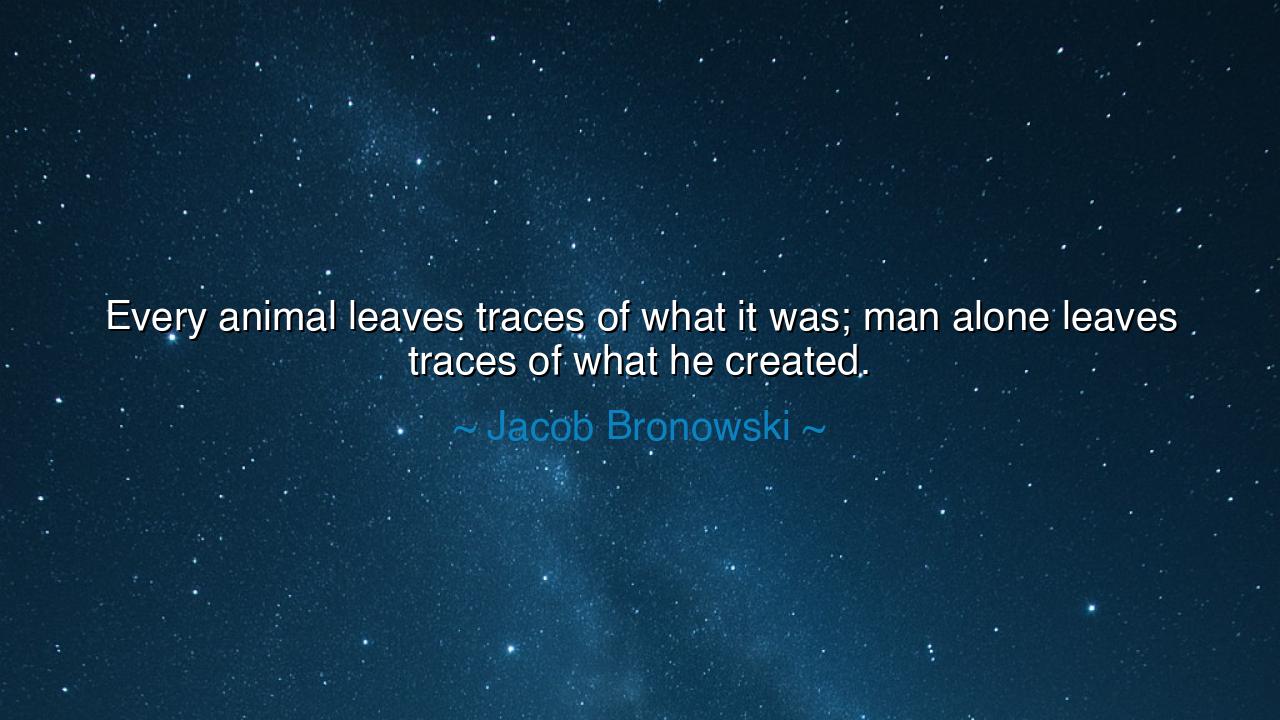
Every animal leaves traces of what it was; man alone leaves






In the profound words of Jacob Bronowski, scientist, philosopher, and poet of reason, he wrote: “Every animal leaves traces of what it was; man alone leaves traces of what he created.” This declaration, at once simple and vast, captures the essence of what it means to be human — the power not only to live, but to create, to shape the world beyond instinct, and to leave behind the imprint of imagination. Where the beast marks the earth with footprints and bones, man marks it with art, knowledge, and memory. The animal perishes, and its trace fades with the dust; but man’s creations — his tools, his words, his dreams made stone or song — endure long after his body has returned to the soil.
Bronowski, who wrote and spoke often of humanity’s ascent from primitive beginnings to scientific wonder, saw in this ability to create the true measure of civilization. His words remind us that humanity’s legacy is not in its survival, but in its expression. The beaver builds a dam, the bird weaves a nest — yet they build only what nature instructs. Man, however, imagines what has never existed, and by his will, brings it forth. He paints upon the walls of caves, he builds cathedrals that touch the heavens, he writes symphonies that echo eternity. The trace of man is not bone or feather, but meaning — carved into stone, sung into air, written into time.
When Bronowski said that “every animal leaves traces of what it was,” he acknowledged our kinship with all life. We, too, are animals; we breathe, hunger, struggle, and die. But the human being, uniquely, transcends mere being. He turns survival into story, and existence into art. Consider the caves of Lascaux, where, some twenty thousand years ago, men and women painted wild bulls and running horses upon the stone walls. Those ancient artists did not paint to eat or to live; they painted to remember, to celebrate, to reveal that within the body of the animal beats the heart of a creator. They, too, left traces of what they created, and those traces still speak to us — luminous whispers across the chasm of millennia.
So it has been in every age. The Egyptians raised pyramids to mirror eternity; the Greeks sculpted gods in marble and composed philosophies that still move the modern mind; the builders of cathedrals filled stone with light and sound, shaping devotion into beauty. These are not traces of what man was, but of what he dreamed. They proclaim, across centuries, that mankind is not content to live as a creature bound to earth — he is a maker, a seeker of immortality through creation. Each generation inherits the world reshaped by the hands and hearts of those who came before. The true bones of humanity are not buried in graves, but stand in the form of bridges, poems, and the ideas that never die.
And yet, Bronowski’s words also carry a warning: the power to create is sacred, but it is also perilous. For man leaves behind not only beauty, but also ruin. The same intellect that paints the Sistine ceiling also builds weapons of destruction. The trace of creation can uplift or devastate. The ruins of Hiroshima are as much a testament to human genius as the frescoes of Florence. Thus, the philosopher calls us to awareness — that what we leave behind will define not only what we were, but what we chose to be. Our creations mirror our morality. They are the handwriting of our collective soul upon the surface of the world.
From Bronowski’s insight arises a sacred duty: to create wisely, to let our works be worthy of remembrance. Whether one is an artist, a teacher, a builder, or a parent, each human being is a creator in some form. Each word spoken, each act of kindness, each invention or idea becomes a trace in the great story of mankind. The question, then, is not whether we will leave traces, but what kind of traces we will leave. Will they speak of greed and destruction, or of compassion and vision?
So let this be the teaching: to live is to leave a mark — but to live well is to leave a gift. Create not merely for fame, but for meaning. Shape the world not as a beast leaving bones behind, but as a maker leaving light. Let your actions, your art, your words become the evidence of your soul’s ascent. For every age is judged by its traces, and the truest measure of a life is not how long it lasts, but how deeply it creates.
Thus, as Jacob Bronowski reminds us, man is the creature who builds beyond himself. Every footprint fades, every body returns to dust — but the work of the spirit endures. Build, then, with love. Create with conscience. Let your trace be one of beauty, so that when the future finds it, it will know that here once lived not merely a being, but a creator.






AAdministratorAdministrator
Welcome, honored guests. Please leave a comment, we will respond soon